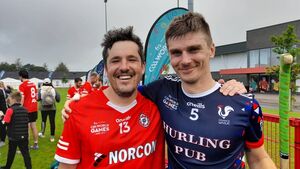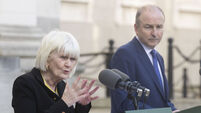The GAA: Everyday people and enduring passion

Liam Twomey (Canada) and Loris Langlois (France) at the recent 2023 World Games held in Derry.
I often reflect on the GAA and its enduring popularity, trying to figure out what makes it so special, so unique. I have come to the conclusion that it is not just one thing but a mixture of many. However, one ingredient is a given; it is an organisation that provides an outlet for people; for their personal, cultural and sporting expression.
One doesn’t even have to be a member of the GAA to be part of the GAA family. Everyone is a participant, and everyone is an expert. The man who never played a game in his life can be the most astute observer, the keenest wit, or the sharpest critic. He will take up a position, either in the pub or on a bank of turf, and wax lyrical on the state of the current parish team. He will say how useless they are – apart from his nephew who, according to the expert himself, should be on the county team.
The GAA is for everyone, the local sage, the great player, the expert administrator, and the loyal mother. Very often, all these people live in the same house. Countless families are steeped in the GAA. In some ways, the GAA defines or reflects family; deep love, undying loyalty, and, thrown in for good measure, the odd fierce row. There is the father who is chairman of the local club, the robust young lad who is the great hope for the parish team, and the hard-pressed mother who washes the kit and makes the sandwiches for the annual club social.
When it comes to the GAA, everyone has skin in the game. The child, the chairman, the club, the county; there is quite simply, something for everyone in the GAA. There is no other Irish organisation that has given rise to as many songs and stories, as many lies and legends, as the GAA.
Every Gaelic footballer is a hero and the older he gets, the better he was. Ask any old player where he played his best game and he is unlikely to say it was on All-Ireland Final Day in Croke Park. No, it will have been in a mountain meadow where he scored his finest goal or kicked his best point. The cow dung on the grass and the slope of the field made no difference to him that day; in fact, he was able to allow for both and still do the business and… there was a county man marking him the same day!
My children all played Gaelic games in their time. It provided them with varying degrees of joy and heartbreak but their involvement in the local club was a hugely valuable part of their formation.
One of my daughters took the game with her to Bordeaux, where she now lives. There, she was able to meet and mix with other Irish people but more importantly, with the French, who were intrigued by our games and our culture. She met her future husband, a Frenchman, at a Bordeaux Gaels training session. He wasn’t just smitten by my daughter; he was smitten by our games as well. Hurling became his great love and earlier this year he arrived in Derry for the 2023 GAA World Games as a member of the French national hurling team. Not only was he proud of his achievements, I was fairly flippin' proud myself.
The GAA World Games are in place to facilitate the huge numbers of GAA clubs now forming all over the globe. It is a most joyful festival of football, hurling and camogie. There were two teams there from Cambodia. The men and women of each team were focused and passionate about their game, our game. While the Cambodians are a diminutive race of people, they took on all-comers with great energy and pace. They didn’t attain much success against the beefier outfits from Birmingham and Berlin but they had a few very tasty corner forwards that most junior clubs in the Ox Mountain region would love to have.
My own local club, Cloonacool, must be the smallest GAA club in Ireland. They continue to exist from year to year with a panel of about 25 players. They are a Junior A football team in a county that has had little success at a national level.
One might think that languishing in such a lowly place would be enough to extinguish the last flicker. Not so! You see, it’s not about success. A rural club defines place and community. After family, the local club is our first belonging. It often provided the first opportunity for children to work together towards a common purpose. It mixes our emotions, drives our passions and forges our friendships.
The size of the club has no real bearing on the size of the reward. Success on the field is almost incidental. Whether you are from Attymass, Bonniconlon, Cloonacool or Dromard, what your GAA club provides is the same everywhere… and it has nothing to do with winning – though that does help when it comes your way.
I often look at the huge clubs in Dublin and Cork and wonder what of their communities, what is GAA like for them. I imagine in my own mind it must be very different from my rural experience. Take the parish of Kilmacud in south Dublin for example. The Kilmacud GAA Club was founded in 1959 by a group of parishioners, led by local priests Fr Robert Walsh and Fr Martin Ryan. The club has grown since then to staggering proportions and yet, their ethos exudes community and belonging. They even have their very own RIP tab on their website!
Some accuse the GAA of being rigid and old-fashioned. Some say they are behind the times and in the modern world of professional sport, a bit unfair to their amateur members. Many players at the top level now lead the dedicated lives of professionals, yet few are properly compensated for their efforts or the entertainment they provide. I have fallen in and out of love with the GAA myself along the way but I am now in a place of almost complete admiration.
Whatever it is about the GAA, whether you love them or loathe them, you have to admire them. They saved our sporting heritage and they have formed an organisation that has proved its worth time and again. They are expert administrators and while slow-moving, they are capable of change. Their ethos engenders nationalism and local pride and yet our games have an appeal the world over. They are in every county, every parish and in every home in Ireland, and if the truth be known, they are also in our deep heart’s core.
The great enigma of the GAA as an organisation is that, while we don’t quite understand it, it helps us to understand ourselves.





